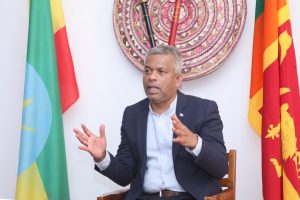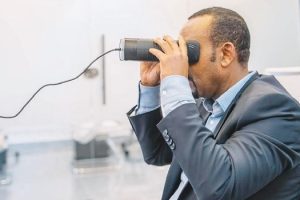
The 33rd Ordinary Session of the Assembly of Heads of State and Government of the African Union had brought together leaders, experts, Ambassador, journalists and special guests from a wide array of countries. Thousands of people had attended the conference at AU headquarter in Addis Ababa. The Ethiopian Herald did approach different commissioners, scholars, ambassadors and analysts, among others.
Today’s guest is Ambassador Bengt van Loosdrecht. He is Ambassador Netherlands to Ethiopia and Djibouti. Simultaneously, he serves as the Permanent Representative to the African Union, IGAD and UNECA in Addis Ababa. He has been in Addis Ababa since 8 August, 2016.
The Ethiopian Herald had a while with the Ambassador during the 33rd Ordinary Session of the Assembly of Heads of State and Government of the African Union held at the AU Headquarters in Addis Ababa, Ethiopia. Excerpts…
The Ethiopian Herald: How did you find the meeting?
Ambassador Bengt: The meeting is very inspiring because there have been conversant presenters out there with inspiring speeches. All the important subjects have been touched up on and I think that is very positive. In addition, there has been a spirit of cooperation in becoming forward looking. I found that very good.
Herald: What did you observe from the meeting?
Ambassador Bengt: Well, more often disparity between agenda setting and implementation are palpable.
We have seen ways how poverty could be curbed. There are many socio-economic programs to ensure food security and reduce poverty in Africa.
On the issue of silencing the gun, the results are unfortunately mixed. But the problem has not reared its grotesque face everywhere in Africa. There is instability at some corners, while there are many countries that portray tranquility. There are very positive and promising initiatives.
I believe that Ethiopia is on the very positive track that leads to democracy. Freedom of speech has become conspicuous. The country is flexing muscles for democratic, free and fair elections. Some of the unfolding have to be taken into account and Ethiopia could set an example for other African countries.
Herald: How do you see Ethiopian Prime Minister’s being a Noble Prize winner?
Ambassador Bengt: The Nobel Prize for peace is an encouragement to the country to stride long in this track and I think it gives a boost to all the policies in this country towards no discrimination.
The other issue is checking there is enough investment to fund the anti-poverty policies of the government. I believe that after the election if the country stabilizes, there will be a boost in investment because I believe the country boasts untouched potential and if the investors do the right thing, the development of Ethiopia with creations of jobs for women and men will be there.
Herald: Could you brief us about the role of Netherlands in Africa’s peace ensuring task?
Ambassador Bengt: We do fund African peacekeeping operation through the European Union. AMISOM is mainly funded by the European Union. Netherlands extends help through that. We have been active in Mali MINUSMA. We are not so active anymore. However, we do fund the peacekeeping through the EU especially in the prevention of conflict which we believe is so important.
Herald: Could you mention some bottlenecks that may challenge AU’s agendas?
Ambassador Bengt: Well, there are many challenges because there is more conflict now than ten years ago. So, that is very serious. The challenges are about getting parties’ sit together and iron out their differences and somewhat reach on a consensus after a through deliberation. We have seen very positive developments in South Sudan but I hope that there will be positive outcomes from South Sudan, Ethiopia, and other countries to arrest conflicts. What we observe is worrisome. That is what we share with speakers here like Moussa Faki and Antonio Guterres.
The expansion of terrorism and extreme political Islamism in the Sahel is also another challenge as mentioned by the UN. I believe that if the sovereignty of the country gets affected it will be a serious problem because non-government territory is where different rules get imposed. And we believe that is dangerous. That would be an incentive for terrorism. But I really hope that together we will be able to combat that and it will not have a spillover effect on the Horn of Africa.
Dealing with terrorism is very difficult as terrorists will have their own way to terrorize people and make victims leave their homes and everything. There is repression and it would be very difficult to fight terrorism if one does not have an inkling of what is going on and to have the means. The answer lies in joining internationally and fighting out terrorism.
Herald: From your rich experience what policies should Africans follow to bring sustainable development in the continent?
Ambassador Bengt: Well, actually it is not for us to say but it is the African Union and African leaders who set the agenda. It was quite clear today Moussa Faki mentioned that terrorism is what scares the continent and needs to be combated. I believe he is right. In addition, few others like Antonio Guterres has raised the issues of climate change, poverty and peace and security. What really strikes me is Cyril Ramaphosa who really puts lots of impasses on the position of women in Africa.
But really according to me, Africans have to set the agenda for Africa and I believe in African Union and they are on the right track.
Herald: If you have something to convey you are welcome?
Ambassador Bengt: I enjoyed the African Union very much. I am really impressed by the idea of free trade in Africa because if something is improved it will go through trade. I believe economic development is a more important aid. That is a very important thing.
THE ETHIOPIAN HERALD SUNDAY EDITIONFEBRUARY 16 / 2020
BY AMBO MEKASA




